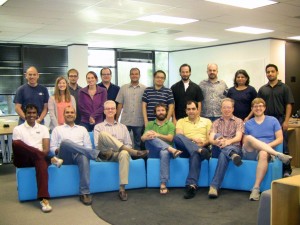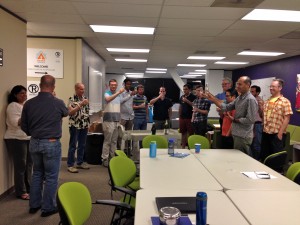The Austin Phoenix editor reflects on her personal experience as a cohort member
by Kelly Holt

This past March I was offered the opportunity to participate in a local startup boot camp program hosted by Tech Ranch®, an entrepreneur accelerator and co-working space. Their eight-week startup boot camp, called Venture Forth™, is intended to help entrepreneurs accelerate their journey and increase their chances of achieving success.
Tech Ranch, located off 183 and MoPac, educates entrepreneurs about the value of social capital and community while providing a space to develop and refine new and raw skills, practice effective communication, and learn the mechanics of starting and launching a business. I was excited for the opportunity to join the program as an entrepreneur — as well as a reporter. My goal during the eight weeks I participated in Venture Forth™ #23, was twofold: Take advantage of all the benefits offered to every participating startup in the program, and then write about my experience for the rest of the Austin startup community.
My First Impression
I first visited Tech Ranch® March 2014 to film a segment for The Austin Phoenix (TAP) Guide to Austin Co-working. By April, I joined VF cohort #23. My interest in the Ranch from my initial visit made me hungry for more information.
As an entrepreneur and journalist, I’d become weary of the cliché buzzwords surrounding startup culture. I was seeking a unique point of view to replace the sugarcoated feed of information TAP often receives from startups. Too often, they read like perfectly polished PR campaigns. Where’s the groundbreaking reality of startup culture in Austin? Where is the “disruption” and risk? I felt as if joining Tech Ranch® and participating in the boot camp was exactly what I’d been searching for in a small business accelerator and professional co-working space.
“Getting out of the space of interpretation and into the space of intention.” – Kevin Leahy, Knowledge Advocate, LLC
Venture Forth™ cohort #23 began April 1, 2014. My group was one of the largest to date, with 13 startups and 19 entrepreneurs from various industries. One of the main selling points of Tech Ranch’s Venture Forth™ program is to create “cohorts” made up of individuals part of a startup at different stages of growth. Some had already launched a product while others were still developing their business plan. (See the list of VF cohort #23 startups below.)
On the first day of class, Tech Ranch® founder, Kevin Koym, asked us to consider why we joined the boot camp. Kevin Leahy, founder of Knowledge Advocate, LLC, said his motivation was to “Get out of the space of interpretation and into a space of intention.” Leahy nailed the program on the head during that first evening. Many entrepreneurs join the program looking for mentors, direction, advice, or clarity. But the program is not intended to place you with mentors or proffer expert advice. Instead, it is designed to educate and enable entrepreneurs to identify blind spots and areas of weakness so they are better equipped to cope with the risks and challenges associated with venture building. Koym, along with a variety of guest entrepreneurs, taught us the basics of business, then encouraged us to put those skills to practice.
Becoming an Entrepreneur
The activity that we practiced the most during VF was the art of pitching. Pitching often — even when you feel unprepared — is a tactic for improving the level of comfort and ease when publicly describing your venture. In the early stages of startup development, no idea is completely polished and perfect, but VF teaches you to zero in on the one important facet of your business, and practice communicating your concept: The why. Once you identify why your venture exists, you can create an elevator pitch and allow yourself to evolve the pitch over time. Koym uses the phrase “polishing the turd” to convey the importance of “iterating your way to success.” The recurring theme in class was to practice and polish, and practice and polish, instead of waiting for a diamond to spontaneously appear.
Action and iteration are two fundamental points of focus during Venture Forth™, but they are not the only lessons. The class is conversational and fluid, and the curriculum can vary per cohort, depending on what each group needs to focus on. Since classes are comprised of a variety of startups, there are no set skills that each person is guaranteed to walk away with. Everyone develops different abilities necessary for gaining traction for their specific journey.
The Cohort
For me, the biggest advantage was acquiring a network of support from my cohort. After consulting with my VF #23 colleagues, I discovered that the social network we were part of was the most valuable aspect of the program for them as well. A month after the class ended, our cohort is still in touch. I’ve also retained information from lessons about the psychology of entrepreneurship and how to become a better leader, in part, by identifying and leveraging the individual strengths of my team members.

Venture Forth™ #23 Cohort
- Anagha Agte, Austin Somatics
- Kevin Leahy, Knowledge Advocate, LLC
- Scott Richards, Cloud Safety Systems
- Casey Smith, Cooking Up Cultures
- Phillip Mishoe, Cooking Up Cultures
- Daniel Heron, Cooking Up Cultures
- Trent Trahern, Green Iron
- Mike Menta, Maker Agent
- Nishin Sura, Book Here Cook Here, as created by Radial Connect
- Maulik Suthar, Book Here Cook Here, as created by Radial Connect
- Muhammad Akbar, Retell
- Muasir Khalil, Retell
- Amado Guloy, Rex Pet Health
- Chris Nudd, Social Pet Registry
- Talbot Presley, Unnamed Water Company
- John Grimshaw, The Austin Phoenix
- Allison Noblitt, The Austin Phoenix
- Eli Saad, Infograpps